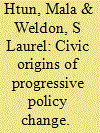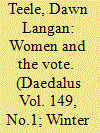| Srl | Item |
| 1 |
ID:
121130


|
|
|
|
|
| Publication |
2012.
|
| Summary/Abstract |
Over the past four decades, violence against women (VAW) has come to be seen as a violation of human rights and an important concern for social policy. Yet government action remains uneven. Some countries have adopted comprehensive policies to combat VAW, whereas others have been slow to address the problem. Using an original dataset of social movements and VAW policies in 70 countries over four decades, we show that feminist mobilization in civil society-not intra-legislative political phenomena such as leftist parties or women in government or economic factors like national wealth-accounts for variation in policy development. In addition, we demonstrate that autonomous movements produce an enduring impact on VAW policy through the institutionalization of feminist ideas in international norms. This study brings national and global civil society into large-n explanations of social policy, arguing that analysis of civil society in general-and of social movements in particular-is critical to understanding progressive social policy change.
|
|
|
|
|
|
|
|
|
|
|
|
|
|
|
|
| 2 |
ID:
171108


|
|
|
|
|
| Summary/Abstract |
There are four contexts in which women have won voting rights: as part of a universal reform for all citizens (15 percent of countries that granted women suffrage); imposed by a conqueror or colonial metropole (28 percent); gradually, after some men had been enfranchised (44 percent); or a hybrid category, often in the wake of re-democratization (14 percent). This essay outlines the global patterns of these reforms and argues that in a plurality of cases, where women's suffrage was gradual, enfranchisement depended on an electoral logic. Politicians subject to competition who believed women would, on average, support their party, supported reform. The suffrage movement provided information, and a potential mobilization apparatus, for politicians to draw on after the vote was extended. Together, both activism and electoral incentives were imperative for reform, providing important lessons for feminist mobilization today.
|
|
|
|
|
|
|
|
|
|
|
|
|
|
|
|